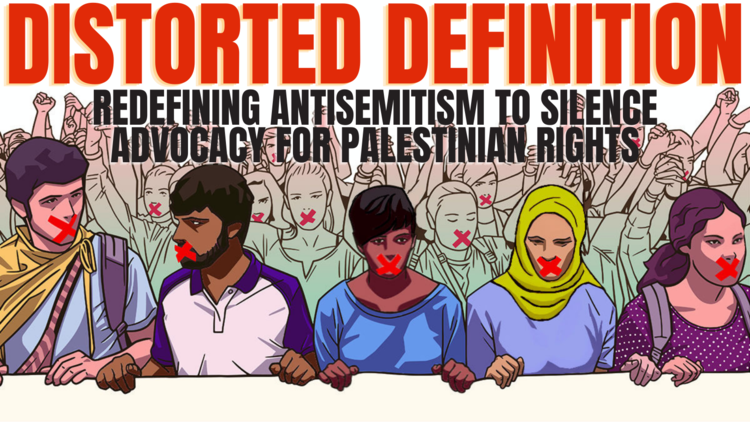40+ Civil and Human Rights Groups to ABA: Controversial IHRA Definition Deployed to Target Advocacy for Palestinian Rights Should Have No Part in Resolution on Antisemitism
/Updated February 10, 2023: Success! On February 6, the ABA passed a revised resolution that had no mention of the IHRA definition. The accompanying report, which is intended as a guide for implementation, still contains problematic language conflating advocacy for Palestinian rights with antisemitism. Those who are members of and involved with ABA chapters should remain vigilant against the use and incorporation of IHRA and the suppression of Palestinian voices and experiences as the ABA implements the resolution.
Last week, Palestine Legal joined more than 40 civil rights, human rights, and grassroots organizations in calling on the American Bar Association (ABA) to remove reference to the controversial International Holocaust Remembrance Alliance (IHRA) Working Definition on Antisemitism in a proposed resolution on antisemitism.
The letter, signed by the ACLU, Center for Constitutional Rights, among several dozen other organizations, notes that “the IHRA definition has been used consistently (and nearly exclusively) not to fight antisemitism, but rather to defend Israel and harm Palestinians – at the cost of undermining and dangerously chilling fundamental rights of free speech, freedom of assembly and protest, and academic freedom.” It warns that the ABA’s embrace of the IHRA definition would legitimize this infringement on core democratic rights as well as undermine the ABA’s own ability to engage on issues related to Palestinian rights.
The ABA's House of Delegates will consider proposed policy Resolution 514 on antisemitism at its meeting during the first week in February. The Resolution states that the ABA urges governments at all levels in the U.S. “to condemn antisemitism as referred to in the IHRA working definition of antisemitism . . . .” The Resolution is co-sponsored by ABA entities, including the Section of Civil Rights and Social Justice, Coalition on Racial and Ethnic Justice, Commission on Sexual Orientation and Gender Identity, International Law Section, and Senior Lawyers Division. It is also co-sponsored by the National Asian Pacific American Bar Association.
Palestine Legal and the Center for Constitutional Rights sent a supplemental letter, providing additional context and examples of how proponents of the IHRA definition use it to censor protected expression in support of Palestinian rights. The examples, which include efforts to threaten and censor educational events, university classes, film screenings, student resolutions to divest from entities profiting from human rights violations, and similar expressive activity, demonstrate how the IHRA definition infringes on fundamental rights and perpetuates anti-Palestinian racism.
“The inclusion of the IHRA definition in proposed Resolution 514 would implicate the ABA in the censorship of constitutionally protected expression and anti-Palestinian discrimination,” said Palestine Legal Senior Staff Attorney, Meera Shah. “The ABA should stand firm in its commitment to the rule of law and justice for all and refuse to endorse a definition that has been weaponized against Palestinians, critics of Israel, and human rights defenders.”
The IHRA definition dangerously conflates criticism of the Israeli state with antisemitism and is routinely deployed to censor those who speak out in support of Palestinian rights. Seven of the 11 contemporary guiding examples attached to the IHRA definition concern Israel, including “Denying the Jewish people their right to self-determination, e.g., by claiming that the existence of a State of Israel is a racist endeavor” and “Applying double standards by requiring of it a behavior not expected or demanded of any other democratic nation.” These guiding examples falsely conflate criticism of Israel with antisemitism and have been weaponized to smear anti-Zionism and support for Palestinian rights as per se antisemitic. Under this definition, Palestinians telling their stories of dispossession and discussing the racism they face as Palestinians could be punished for anti-Jewish discrimination, an absurd and unlawful result.
If you are a member of the ABA and would like to connect with others working to oppose the IHRA reference in the proposed ABA resolution, please reach out, and we can connect you.
For more information, check out our resource page on the Distorted IHRA Definition and our 2-pager with JVP Action.


